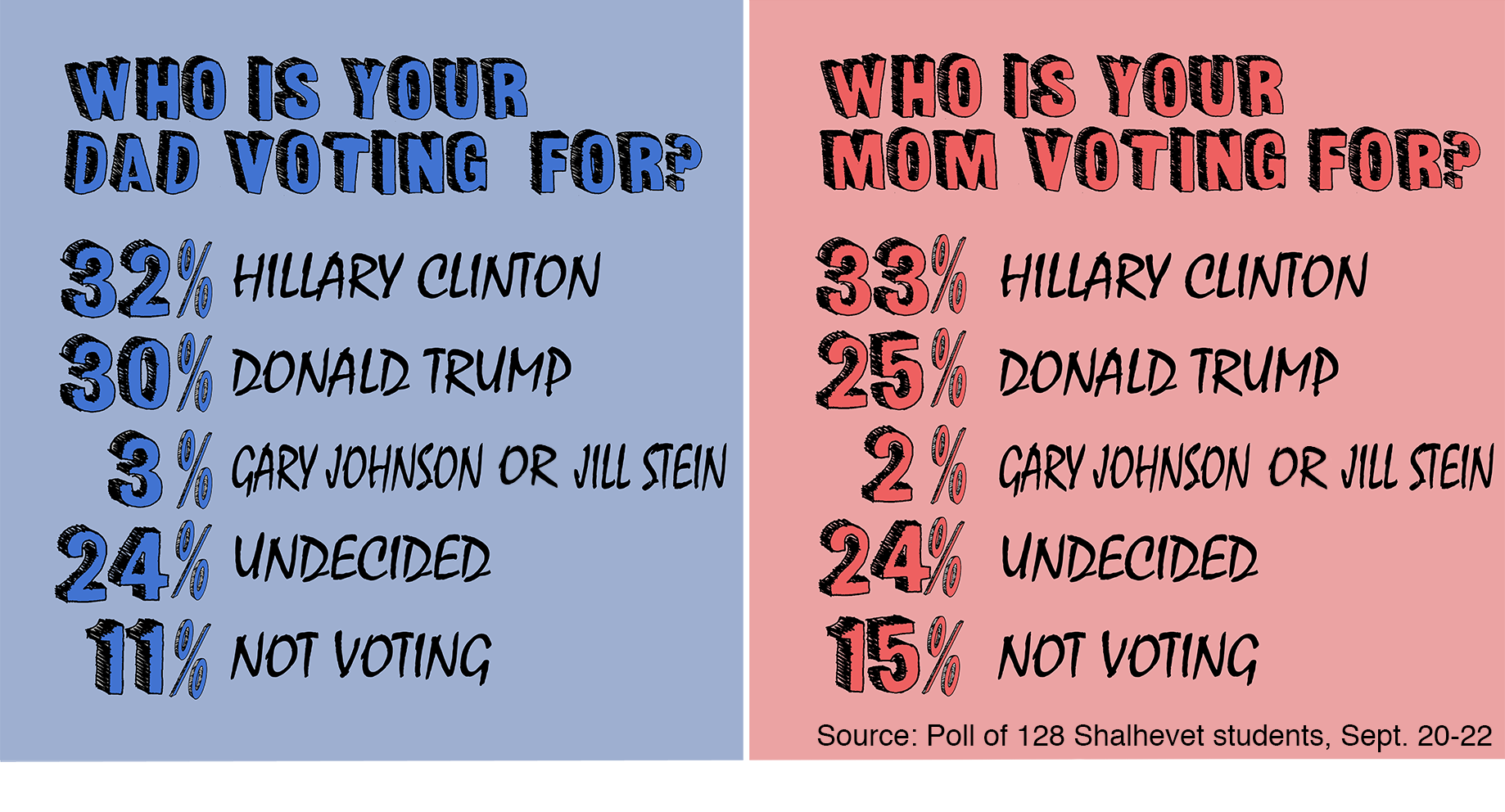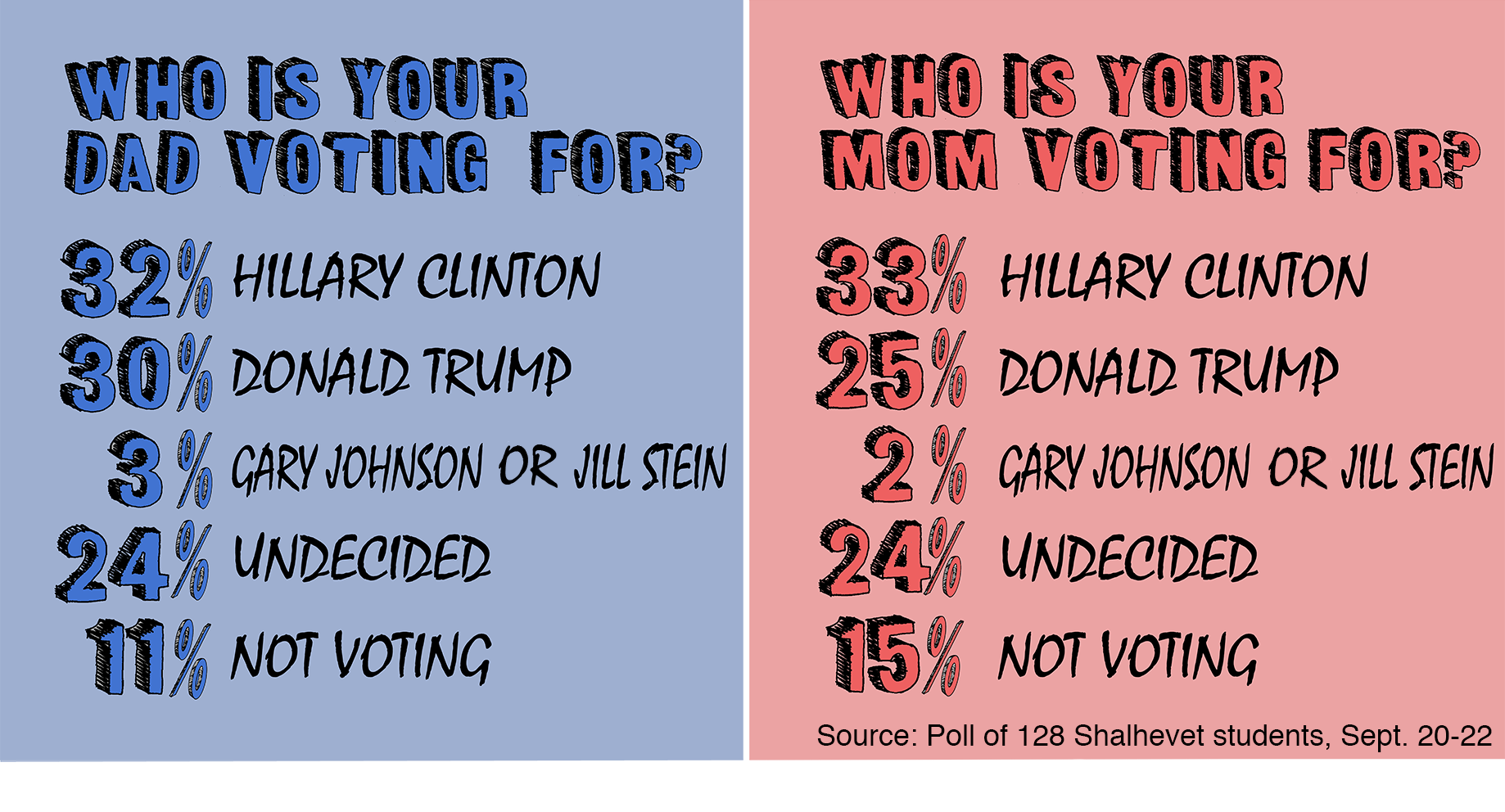HOUSES DIVIDED: Presidential race challenges Shalhevet families
Most students agree with their parents about the election, but disagreement poses a real challenge this year
October 27, 2016
Republican Son Is A Chance For Both Sides To Learn To Listen
During the first presidential debate Sept. 26, senior Yaakov Sobel’s mom said Hillary Clinton was winning because she appeared to have brought notes and therefore seemed more prepared.
Sitting next to her on his family’s sofa, Yaakov disagreed. He thought Donald Trump appeared more all-powerful and all-knowing having not brought notes.
And yet, he didn’t say so. He suppressed his view to maintain shalom bayit – in English, peace in the household.
Yaakov said he has been doing this since he came to the realization that he holds mostly conservative beliefs during 2014, when political discord came to a head after the capture and murder of three Israeli boys by terrorists, along with protests in Ferguson, Mo., and an increase in coverage of mass shootings.
His mother, Dr. Julianne Sobel, similarly often withholds her more liberal thoughts to preserve the good relationship she has with her son.
“A lot of the time I don’t share my opinion, I just listen respectfully,” Dr. Sobel said. “I don’t think the silence implies agreement. In our family it implies ‘I’m listening to you.’”
Yaakov and his mother have been able to maintain peace and respect despite disharmony that the 2016 election season has brought to many American families and friendships.
Immigration, guns, Israel and racial tensions in America are the main things Yaakov and his mother disagree on. Though Yaakov does not support all of Trump’s policies, like the wall he plans to build between America and Mexico, he likes the principles behind even the candidate’s more controversial stances.
“They are not politically correct, they are not PC by any means,” Yaakov said. “But I think that a lot of those things are things that need to be done. Whereas Hillary, she’s gonna go about everything around being PC and she’s not really gonna create any change, and if she does it will just be to make things more politically correct.”
He also believes there should be much stricter immigration control. His mother is much more amicable toward immigrants.
“I believe that the people who are here need to stay here,” Dr. Sobel said. “This is their home and they’re contributing members of society, so they should have amnesty and they should be granted citizenship.”
She said her idea of social justice and her professional experience as a psychologist are the main reasons she will be voting Democratic this November.
Maintaining civility has taken some discipline. Two years ago, Yaakov and his mom were discussing the West Bank on the way home home from school. Yaakov believed most of the remaining Palestinian territory should be annexed by Israel, whereas his mom leaned more toward a two-state solution at the time, as long as Israelis living in the settlements could remain there.
This discussion, Yaakov said, slowly devolved into something less civil. But they were careful not to raise their voices.
“If we could continue at a de-escalated tone, and a de-escalated manner, then we would continue talking,” he said. “But if we couldn’t find a way to maintain that respect, then the conversation ends, because as soon as you start involving disrespect it’s no longer a conversation. It’s now an argument where neither side is being heard.”
Yaakov believes this distinction between a discussion and an argument is whether both sides are listening with an open mind.
“I think that ties in to really what Shalhevet has taught me,” he said. “It’s something that’s unspoken and it’s unformulated, but it’s an idea at Shalhevet that the main focus is that we get educated.
“Then you have to be willing to change based on the outcome of the discussion.”
His mother said a key to respect and peace is understanding what she calls “different truths.”
“Being a psychologist has helped me because I’ve helped all kinds of people,” she says. “You get to know people as people. I think you have to remember we’re all created in the image of God. People have different perspectives. They’re a product of their environment.”
Yaakov and his mother are close for other reasons as well. Both are avid singers and performers. Yaakov sings bass for the Choirhawks and his mother, a soprano, used to perform for the Jewish Women’s Repertory Company. They both love for rock n’ roll and even go to concerts together.
“My mom knows all the new music and is always like, ‘Oh my gosh let me show you this new EDM artist,’ and I always get into whatever she shows me,” Yaakov said.
He said their success in political discussions has also improved other areas of their relationship, like setting curfew and other rules.
He used the metaphor of a “two-way street” to describe how they do it.
“If both drivers know how to drive — know what they’re talking about; give the right of way — allow the other person to talk; signal — explain what they intend to say; and follow the laws of the road — don’t yell or lose control,” he said, they can drive their cars in opposite directions and not have a collision — not say that the other side is “wrong.”
Yaakov’s father, Mr. Scott Sobel, is also a Trump supporter who, like his wife and son, believes in the value of shalom bayit.
“We don’t ever argue about politics because life is too short, and certainly politics is a subject that is forbidden at the Shabbos or Yom Tov table,” Mr. Sobel said. “Shalom bayit can never be sacrificed for any political reasons.”

Daughter Is A Democrat, So Some Things Are Better Not Discussed
During the occasional car ride in their silver Honda hybrid, Hannah Jannol is listening to Donald Trump debate on MSNBC with her Republican family. In the front, her mother and 14-year-old brother Avi comment in agreement, while in the back, 16-year-old Hannah rolls her eyes and looks out the window — trying to tune out Trump.
Her 11-year-old sister Alina, who has not yet formulated a political opinion, sits in silence next to her. If Hannah hears something she really disagrees with, she’ll retort back — causing her mother, Ms. Batya Jaffe, to raise her voice.
Hannah has known she is a liberal Democrat since seventh grade, when she started to explore social activism articles posted on Facebook. Feminist blogger Marina Watanabe introduced her to liberalism.
Since then she has taken her passion for social justice to The Boiling Point, where she reported the story of a Jewish transgender man named Benjamin Kenner, originally Rochel-Leah Kenner. Ms. Jaffe disapproved of this, because she doesn’t believe that people should publicize uncomfortable topics when there are more pressing issues to write about, like the government taking money from people to give to the unemployed through taxes.
Although she feels her family rejects her opinions, Hannah is confident in her liberal stance and doesn’t hesitate to defend it. She says she learned this perseverance from kickboxing — another one of her passions.
In kickboxing, she said, when someone hits you, you hit back and defend yourself. When she feels it is necessary, Hannah defends her liberal views. But her parents’ minds, too, are made up.
“I’ll listen to them, but they won’t listen to me,” said Hannah of her parents — Ms. Jaffe and Mr. Neal Jannol, Hannah’s dad.
Ms. Jaffe favors Trump’s wall between America and Mexico, while Hannah does not. Ms. Jaffe favors deporting illegal immigrants, while Hannah does not. Ms. Jaffe is gets upset when media feature gay couples, saying it forces multiculturalism on viewers, while Hannah loves to see, say, a biracial or gay couple on a TV show.
Sometimes these differences cause tension in the family. There have been times when a political argument between Hannah and her brother Avi made Hannah so upset that she didn’t talk to him for a couple of days. Hannah said these periods of silence usually occur after heated debates about social equality — something she takes very seriously that her brother views as insignificant.
Ms. Jaffe tries to avoid this type of conflict by not talking about political topics, especially things like feminism and social activism. It’s more important for her to have family harmony.
But it’s difficult for Hannah to not talk about Donald Trump, especially now during the election season. She is outraged by what she sees as Trump’s racism and sexism; her mom doesn’t think it’s an important issue.
“My mom and my brother and a lot of other Trump supporters just seem to not really care that he says those things, and I think they’re underestimating it and they’re minimizing it,” said Hannah.
“We’re at a turning point in history where we can … take huge strides towards equality, and I think that we’re really almost there, but right now the issues of inequality are more nuanced. On paper, black people have equal rights, but socially, are they treated the same? I don’t think so.“
If Hannah tries to share her political opinions, Ms. Jaffe will quickly quiet her in an attempt to evade arguing. However, she’s slower to quiet Avi if he raises the subject, Hannah believes.
Still, even in this divided season, there have been signs of movement in Hannah’s family – in both directions.
This past July 4 weekend, Hannah and her family visited the Castro District in San Francisco — a gay neighborhood — during a vacation. Although there were some moments of discomfort for her mother, like when they passed two men holding hands, it made Hannah hopeful that her family’s tight bonds were strong enough to accept her liberal views.
And Hannah herself may be coming around to her mother’s view that some things are better not to discuss.
“I’d rather just let them believe what they want to believe, and to just not really talk about [politics] any more with them,” said Hannah. “I just feel like it is unproductive and harmful to our relationship unnecessarily.”
